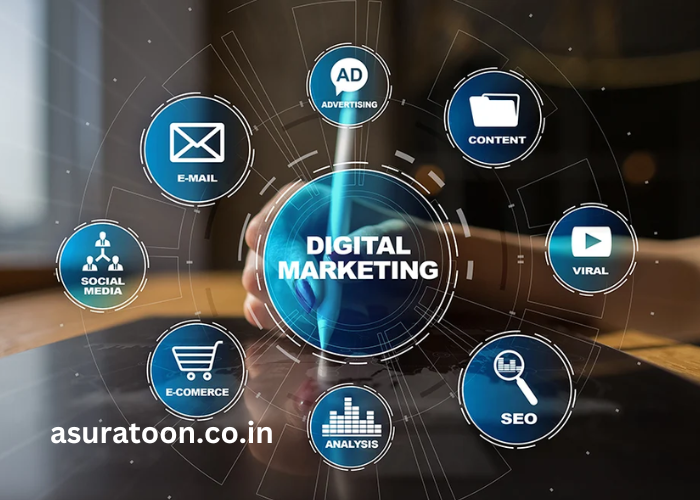The tech industry evolves rapidly, and so does digital marketing. As new technologies and platforms emerge, marketing strategies must adapt to keep up with these changes. This article explores the latest digital marketing trends shaping the tech sector, helping businesses stay competitive and relevant.
Introduction to Digital Marketing in the Tech Industry
Digital marketing is a cornerstone of growth for tech companies, offering tools and strategies to connect with a global audience. With innovations like artificial intelligence, augmented reality, and personalized marketing, the tech sector is leading the way in redefining digital marketing practices.
1. The Rise of AI-Powered Marketing
Artificial intelligence (AI) is transforming digital marketing by enabling smarter, more efficient campaigns.
Key Applications of AI:
- Chatbots for real-time customer support.
- Predictive analytics for better decision-making.
- Personalized recommendations to enhance user experience.
2. Content Marketing: Quality Over Quantity
In the tech industry, content remains king, but the focus is shifting toward quality and value.
Trends in Content Marketing:
- Interactive content like quizzes and polls.
- Educational blogs and whitepapers tailored to tech-savvy audiences.
- Video content, including tutorials and product demos.
3. Voice Search Optimization
With the rise of voice-activated devices, optimizing for voice search has become essential for tech marketers.
Strategies for Voice SEO:
- Using natural language and conversational keywords.
- Answering questions directly in content.
- Optimizing for local search queries.
4. Influencer Marketing in the Tech World
Influencers play a significant role in promoting tech products and services, especially among niche audiences.
Key Insights:
- Collaborating with tech-focused influencers.
- Emphasizing authenticity and expertise.
- Leveraging micro-influencers for targeted campaigns.
5. The Shift Toward Privacy-Centric Marketing
With increasing regulations like GDPR and CCPA, privacy-centric marketing is no longer optional.
Key Strategies:
- Transparent data collection practices.
- Building trust through ethical marketing.
- Utilizing first-party data for personalized campaigns.
6. Video Marketing: The Power of Visual Storytelling
Video marketing remains a dominant trend, capturing attention and driving engagement across platforms.
Effective Video Strategies:
- Live streaming product launches and webinars.
- Short-form videos on platforms like TikTok and Instagram Reels.
- Explainer videos for complex tech concepts.
7. The Growth of Programmatic Advertising
Programmatic advertising automates ad buying, offering precise targeting and efficiency.
Benefits for Tech Marketers:
- Real-time bidding for ad placements.
- Improved ROI through data-driven decisions.
- Integration with AI for smarter ad campaigns.
8. Augmented and Virtual Reality in Marketing
AR and VR technologies are revolutionizing customer engagement, especially in the tech sector.
Applications in Digital Marketing:
- Virtual try-ons for tech gadgets.
- Immersive product demos and training sessions.
- Gamified AR experiences to boost engagement.
9. Social Media’s Evolving Role in Tech Marketing
Social media platforms are continuously adapting, providing new opportunities for tech marketers.
Trends to Watch:
- Building communities through niche platforms like Discord.
- Leveraging LinkedIn for B2B tech marketing.
- Using social commerce features on Instagram and Facebook.
10. Data-Driven Marketing Strategies
Data analytics remains a cornerstone of effective digital marketing, helping brands make informed decisions.
Key Tactics:
- Using predictive analytics to anticipate customer needs.
- Real-time monitoring of campaign performance.
- Segmenting audiences for personalized messaging.
11. Chatbots and Conversational Marketing
Chatbots are becoming smarter, providing seamless customer interactions and boosting conversions.
Benefits of Chatbots:
- 24/7 customer support.
- Guiding users through the sales funnel.
- Collecting insights for lead generation.
12. Sustainability and Purpose-Driven Marketing
Tech companies are aligning their marketing efforts with sustainability and social responsibility to appeal to conscious consumers.
Strategies to Adopt:
- Highlighting eco-friendly initiatives.
- Partnering with organizations for social impact campaigns.
- Showcasing ethical practices in operations and marketing.
13. Omnichannel Marketing for Consistency
An omnichannel approach ensures a seamless customer experience across multiple platforms.
Key Components:
- Integrating email, social media, and website marketing.
- Personalizing experiences across touchpoints.
- Using unified analytics to track customer journeys.
14. Emerging Technologies in Digital Marketing
New technologies are pushing the boundaries of what’s possible in digital marketing.
Innovations to Explore:
- Blockchain for secure ad transactions.
- 5G for enhanced mobile marketing experiences.
- IoT integration for personalized marketing based on device usage.
Conclusion: Staying Ahead in the Digital Marketing Landscape
The tech industry is at the forefront of digital marketing innovation, constantly adapting to new technologies and trends. To succeed in this dynamic environment, businesses must stay informed, embrace emerging tools, and prioritize customer-centric strategies. By doing so, they can build stronger connections with their audience, drive growth, and maintain a competitive edge in the market.

